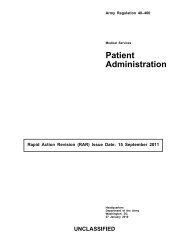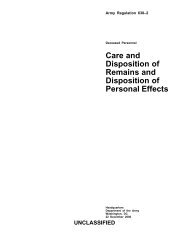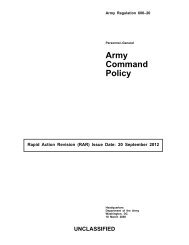Officer Transfers and Discharges - Army Publishing Directorate ...
Officer Transfers and Discharges - Army Publishing Directorate ...
Officer Transfers and Discharges - Army Publishing Directorate ...
Create successful ePaper yourself
Turn your PDF publications into a flip-book with our unique Google optimized e-Paper software.
Chapter 4<br />
Eliminations<br />
Section I<br />
Scope<br />
4–1. Overview<br />
a. An officer is permitted to serve in the <strong>Army</strong> because of the special trust <strong>and</strong> confidence the President <strong>and</strong> the<br />
nation have placed in the officer’s patriotism, valor, fidelity, <strong>and</strong> competence. An officer is expected to display<br />
responsibility commensurate to this special trust <strong>and</strong> confidence <strong>and</strong> to act with the highest integrity at all times.<br />
However, an officer who will not or can not maintain those st<strong>and</strong>ards will be separated.<br />
b. Every officer deserves a fair chance to demonstrate their capabilities. When an officer shows ineffective<br />
tendencies (especially if the officer is inexperienced) when practicable, they will be given another chance under another<br />
comm<strong>and</strong>er. The officer’s ineffectiveness will be systematically recorded in documents that specify each period<br />
covered, duties observed, <strong>and</strong> defects noted. Recommendations for elimination action will not be based on generalities<br />
<strong>and</strong> vague impressions. It is necessary to document, in writing, the precise reasons an officer is considered ineffective.<br />
c. A U.S. <strong>Army</strong> Reserve or ARNG officer must hold, or be capable of holding, a security clearance of at least<br />
secret. An Active <strong>Army</strong> officer must hold a security clearance of at least secret. This requirement may not be waived.<br />
The final denial or revocation of an officer’s Secret security clearance by appropriate authorities acting pursuant to<br />
DODD 5200.2–R <strong>and</strong> AR 380–67 requires the discharge of that officer from the service.” An officer whose security<br />
clearance has been withdrawn or withheld due to unfavorable information regarding loyalty, subversion, or security<br />
violations may be processed for involuntary separation under AR 380–67, paragraph 8-201.2. In accordance with AR<br />
380–67, paragraph 8–103, however, the officer should first be considered for discharge under this regulation. The<br />
administrative procedures prescribed in AR 380–67, chapter 8, will be followed until the case is referred to HRC-<br />
Alex<strong>and</strong>ria (AHRC-OPD-A).<br />
d. Comm<strong>and</strong>ers will counsel <strong>and</strong> review all separation actions in accordance with paragraph 1–34(a)(b), of this<br />
regulation<br />
e. This chapter prescribes the tasks, rules, <strong>and</strong> steps for eliminating officers in the Active <strong>Army</strong> for subst<strong>and</strong>ard<br />
performance of duty, misconduct, moral or professional dereliction, <strong>and</strong> in the interests of national security.<br />
4–2. Reasons for elimination<br />
While not all inclusive, when one of the following or similar conditions exist, elimination action may be or will be<br />
initiated as indicated below for—<br />
a. Subst<strong>and</strong>ard performance of duty.<br />
(1) A downward trend in overall performance resulting in an unacceptable record of efficiency, or a consistent<br />
record of mediocre service.<br />
(2) Failure to keep pace or to progress with contemporaries, as demonstrated by a low record of efficiency when<br />
compared with other officers of the same grade <strong>and</strong> competitive category.<br />
(3) Failure to exercise necessary leadership or comm<strong>and</strong> expected of an officer of their grade.<br />
(4) Failure of an officer to absorb technical proficiency required for grade <strong>and</strong> competitive category.<br />
(5) Failure to properly perform assignments commensurate with an officer’s grade <strong>and</strong> experience.<br />
(6) Apathy, defective attitudes, or other characteristic disorders to include inability or unwillingness to expend<br />
effort.<br />
(7) Failure to respond to alcohol or drug problem rehabilitation efforts in a reasonable length of time. (See AR 600–<br />
85 for further explanation.) Elimination action will be initiated. Care should be taken to avoid the inclusion of limiteduse<br />
evidence, as defined in AR 600–85, chapter 6.<br />
(8) Failure to conform to prescribed st<strong>and</strong>ards of dress, personal appearance, or military deportment.<br />
(9) Failure to achieve satisfactory progress after enrollment in the <strong>Army</strong> weight control program or failure to<br />
maintain the weight/body fat st<strong>and</strong>ards established under the provisions of AR 600–9 after removal from an established<br />
weight control program. Elimination action will be initiated. This provision does not include those judge advocates <strong>and</strong><br />
AMEDD officers who have incurred a statutory ADSO for participating in <strong>Army</strong> sponsored education <strong>and</strong> training<br />
programs such as the FLEP (10 USC 2004), Armed Forces Health Professions Scholarship Program, or the Uniform<br />
Services University of the Health Sciences (10 USC, chapters 104, 105).<br />
(10) When no medical problems exist, <strong>and</strong> an officer has two consecutive failures of the APFT, elimination action<br />
will be initiated. This provision does not include those judge advocates <strong>and</strong> AMEDD officers who have incurred a<br />
statutory ADSO for participating in <strong>Army</strong> sponsored education <strong>and</strong> training programs such as the FLEP (10 USC<br />
AR 600–8–24 12 April 2006/RAR 19 November 2008<br />
57
















